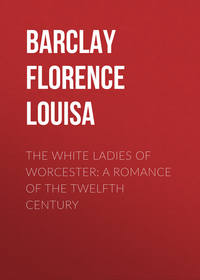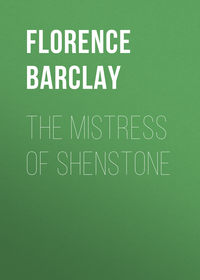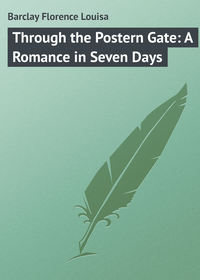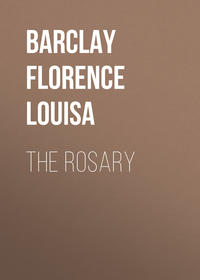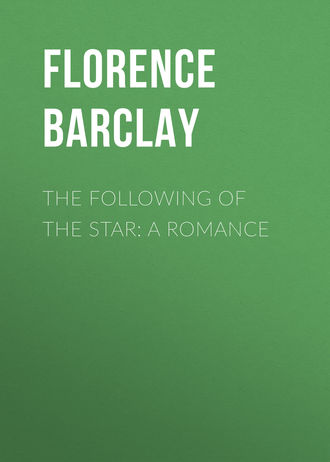 полная версия
полная версияThe Following of the Star: A Romance
"If so, look up, honestly, and say: 'Uncle Falcon, you have won'; and I hereby forgive Inglestry all his fuss and bluster, and you, the obstinacy of years – and may Heaven bless the wedding-day.
"But – ah, there's a 'but' in all things human! Perhaps the world where I shall be, when you are reading these lines, is the only place where buts cease to be, and where all things go straight on to fulfilment.
"But – your happiness, my own dear girl, is of too much real importance for me to risk it, on the possible chance of the right man not having turned up; or of you – true Rivers that you are – proving obstinate to the end.
"Therefore – enclosed herewith you will find a later codicil than that known to you and Inglestry, duly witnessed by Ford and his clerk, nullifying the other, and leaving you my entire property as stated in my will, subject to no conditions whatsoever.
"Thus, my dear Diana, if you are on the eve of preparing to leave Riverscourt, you may unpack your trunks, and stay there, with your uncle's love and blessing. It is all your own.
"Or – but knowing you as I do, I hardly think this likely – if you are on the eve of making a marriage which is not one of love, and which is causing you in prospect distress and unhappiness – why, break it off, child, and send the man packing. If he is marrying you for your money, he deserves the lesson; and if he loves you for your splendid self, why he is not much of a man if he has been engaged to such a girl as my niece Diana, without having been able to win her, before the eve of the wedding-day!
"Anyway, you now have a free hand, child; and if my whim of testing fate for you with the first codicil, has put you in a tight place, old Inglestry will see you through, and you must forgive your departed uncle, who loves you more than you ever knew,
"Falcon Rivers."Diana dropped the letter, flung herself down on the sofa cushions, and burst into a passion of weeping.
Mr. Inglestry, helpless and dismayed, took off his glasses and polished them with his silk pocket-handkerchief; put them on again; leaned forward and patted Diana's shoulder; even ventured to stroke her shining hair, repeating, hurriedly: "It can all be arranged, my dear. I beg of you not to upset yourself. It can all be arranged."
Then he picked up the codicil, and examined it carefully. It was correct in every detail. It simply nullified the private codicil, and confirmed the original will.
"It can all be arranged, my dear," he repeated, laying a fatherly hand on Diana's heaving shoulder. "Do not upset yourself over this unfortunate marriage complication. I will undertake – "
"It is not that!" cried Diana, sitting up, and pushing back her rumpled hair. "Oh, you unimaginative old thing! Can't you understand? All these months it has been so hard to have to think that Uncle Falcon's love for me had really been worth so little, that, in order to prove himself right on one silly point, he could treat me as he did in that cruel codicil. He could not have foreseen the simply miraculous way in which Providence and my Cousin David were coming to my rescue, at the eleventh hour. Otherwise it must have meant, either a hateful marriage, or the loss of home, and money, and everything I hold most dear. But by far the worst loss of all was to lose faith in the truest love I had ever known. In my whole life, no love had ever seemed to me so true, so faithful, so completely to be trusted, as Uncle Falcon's. To have lost my belief in it, was beginning to make of me a hard and a bitter woman. That codicil was costing me more than home and income. And now it turns out to have been merely a test – a risky test, indeed! Think if either of us had told Rupert of it, before the time specified; or if I had been going to marry Rupert or any other worldly-minded man, who would have made endless trouble over being jilted! But – dear old thing! He didn't think of that. He was so sure his plan would lead to my making a happy marriage, notwithstanding my prejudices and my principles. He was wrong, of course. But the main point brought out by this second codicil is: that he really cared. I can forgive him all the rest, now I know that Uncle Falcon loved me too well really to risk spoiling my life."
Diana dried her eyes; then raised her head, snuffing the air with the keenness of one of her own splendid hounds.
"Oh, Mr. Inglestry," she said; "do go and see if that person is still on the mat! I have been talking at the top of my voice, and I believe I scent hair-oil!"
The old lawyer tiptoed to the door, opened it cautiously, and looked up and down the brightly lighted corridor. From the distance came the constant clang of the closing of the elevator gates, and the sharp ting of electric bells.
He shut the door, and returned to his seat.
Diana was reading the codicil.
"I wonder why he called in that Ford creature," she said. "Why did he not intrust this envelope to you?"
"My dear," suggested Mr. Inglestry, "knowing my affection for you, knowing how deeply I have your interests at heart, your uncle may have feared that, if I saw you in much perplexity, in great distress of mind over the matter, I might have let fall some hint – have given you some indication – "
"Why, of course!" said Diana. "Think how you would have caught it to-day, if you hadn't. You would have been much more afraid of me, on earth, than of Uncle Falcon, in heaven!"
Mr. Inglestry lifted his hand in mute protest; then took off his glasses, and polished them. The remarks of Miss Rivers were so apt to be perplexing and unanswerable.
"Let us leave that question, my dear young lady," he said. "Your uncle adopted a remarkably shrewd course for attaining the end he desired. Meanwhile, it remains for us to deal with the present situation. I advise that we send immediately for your cousin, David Rivers. Of course this marriage of – of convenience, need not now take place."
Diana looked straight at the old lawyer for a few moments, in blank silence. She turned the ring upon her finger, so that the diamond was hidden. Then she said, slowly:
"You suggest that we send for David Rivers, and tell him that – this second codicil having turned up – we shall not, after all, require his services: that he may sail for Central Africa to-morrow, without going through the marriage ceremony with me?"
"Just so," said Mr. Inglestry, "just so." Something in Diana's eyes arresting further inspiration, he repeated rather nervously: "Just so."
"Well, I absolutely decline to do anything of the kind," flashed Diana. "Think of the intolerable humiliation to David! After overcoming his own doubts in the matter; after disposing of his first conscientious scruples; after making up his mind to go through with this for my sake, and being so faithful about it. After all the papers we have signed, and the arrangements we have made! To be sent for, and calmly told his services are no longer required! Besides – though I don't propose to be much to him, I know – I am all he has in the world. He will sail to-morrow feeling that at least there is one person on this earth who belongs to him, and to whom he belongs; one person to whom he can write freely, and who cares to know of his joys or sorrows; his successes or failures. Poor boy! Could I possibly, to avoid a little bother to myself, rob him of this? I – who owe him more than I can ever express? Besides, he could never – after such a slight on my part – accept the money I am giving to his work. In fact, I doubt if he would accept so much, even now, were it not that he believes I owe my whole fortune to the fact of his marriage with me."
Diana turned the ring again; and the diamond shone like a star on her hand.
"No, Mr. Inglestry," she said, with decision. "The marriage will take place to-morrow, as arranged; and my Cousin David must never know of this new codicil."
The lawyer looked doubtful and dissatisfied.
"The fact of the codicil remains," he said. "Your whole property is now safely your own, subject to no conditions whatever. You have nothing to gain by this marriage with your cousin; you might – eventually – have serious cause to regret the loss of liberty it will entail. I do not consider that we are justified in allowing the ceremony to take place without informing him of the complete change of circumstances, and acquainting him with the existence of this second codicil."
"Very well," said Diana.
With a sudden movement, she rose to her feet, whirled round on the hearthrug, tore the codicil to fragments, and flung them into the flames.
"There!" she cried, towering over the astonished little lawyer in the large armchair. "Now, no second codicil exists! I can still keep my restored faith in the love of Uncle Falcon; but I shall owe my home, my fortune, and all I possess, to my husband, David Rivers."
CHAPTER XVI
IN OLD ST. BOTOLPH'S
At twenty minutes past ten, on the morning of the Feast of Epiphany, David Rivers stood in the empty church of St Botolph's, Bishopsgate, awaiting his bride.
Perhaps no man ever came to his wedding looking less like a bridegroom than did David Rivers.
Diana had scorned the suggestion, first mooted by Mrs. Marmaduke Vane, of clerical broadcloth of more fashionable cut, to be worn by David for this one occasion.
"Rubbish, my dear Chappie!" had said Diana. "You are just the sort of person who would marry the clothes, without giving much thought to the man inside them. I don't propose to be in white satin; so why should David be in broadcloth? I shall not be crowned with orange-blossom, so why should David go to the expense of an unnecessary topper? He could hardly wear it out, among his savages in Central Africa. They might get hold of it; make of it a fetish; and, eventually, build for it a little shrine, and worship it. An article might then be written for a missionary magazine, entitled: 'The Apotheosis of the silk top-hat of the Rev. David Rivers!' I shall not wear a train, so why should David appear in a long coat. Have a new one for the occasion, David, because undoubtedly this little friend, though dear, is an old friend. But keep to your favourite cut. You would alarm me in tails or clerical skirts, even more than you do already."
So David on his wedding morning looked, quite simply, what he really was: the young enthusiast, to whom outward appearance meant little or nothing, just ready to start on his journey to Central Africa.
His friend, the doctor, with whom David had spent his last night in England, might, with his frock coat, lavender tie, and buttonhole, easily have been mistaken for the bridegroom, as the two stood together in the chancel of St. Botolph's.
"I cannot be your best man, old boy," Sir Deryck had said, "because, years ago, I did, myself, the best thing a man can do. But I will come to your wedding, and see you through, if it is really to take place at half-past ten in the morning, and if I may be off immediately afterwards. You are marrying a splendid girl, old chap. I only wish she were going with you to Ugonduma. Yet, I admit, you are doing the right thing in refusing to let her face the dangers and hardships of such life and travel. Only – David, old man – if you want any married life at all, you must be back within the year. With this unexpected attraction drawing you to England and home, you will hardly keep to your former resolution, or remain for longer in that deadly climate."
David had smiled, bravely, and gripped the doctor's hand. "I must see how the work goes on," he said; and prayed to be forgiven the evasion.
Mr. Goldsworthy was robing in the vestry, and kept peeping out, in order to make his entry into the chancel just before Diana's arrival. There could not, under the circumstances, be much processioning in connection with this wedding; but, what there was should be dignified, and might as well be effectively timed.
Mr. Goldsworthy had passed through some strenuous moments in the vestry with David, over the question of omissions or non-omissions from the wedding service. He knew Diana's point of view; in fact he had received private instructions from his god-daughter to bully David into submission – "just as Sarah bullies you, you know, god-papa." He knew Sarah's methods of bullying, quite well; but felt doubtful about applying them to David. In fact, when the question came up, and the moment for bullying had arrived, he turned his attention to buttoning his cassock, and meekly agreed to David's firmly expressed ultimatum.
You cannot button a cassock – a somewhat tight cassock – (why do cassocks display so inconvenient a tendency to grow tighter each week?) and at the same time satisfactorily discuss a difficult ecclesiastical point (why do ecclesiastical points become more and more involved every year?) with a very determined young man. This should be his excuse to Diana for failing to bully David into submission.
In his heart of hearts he knew the younger man was right. He himself had grown slack about these matters. It was years since he had repeated the creed of Saint Athanasius. It had a tendency to make him so breathless. When David had recited it on Christmas morning, the congregation had not known where to find it in the prayer-book; and Mr. Churchwarden Smith had written the absent Rector an indignant letter accusing David of popery. He was glad to remember that, in his reply, though feeling very unequal to letter-writing, he had fully justified his locum-tenens.
The clock struck the half-hour. Mr. Goldsworthy peeped out again.
David and the doctor were walking quietly about in the chancel, examining the quaint oak carvings. At that moment they stood, with their backs to the body of the church, studying the lectern. David did not need to watch for the arrival of Diana. He knew Mrs. Marmaduke Vane was to enter first, with Mr. Inglestry. Diana had told him she should walk up the church alone.
As yet, beside the usual church officials, Sarah Dolman was the only person present. Sarah, having a married niece in town, who could put her up for the night, had insisted upon attending the wedding of her dear Miss Diana and that "blessed young gentleman," of whom the worst that could be said, in Sarah's estimation, appeared to be: that it was a pity there was not more of him!
She was early at the church, "to get a good place"; and had shifted her seat several times, before David arrived. In fact she tried so many pews, that the careful woman always on duty as verger at St. Botolph's, began to look upon her with suspicion.
Sarah had feared she would not succeed in catching David's eye; but David had seen her directly he came into the chancel. He had also noticed, in Sarah's bonnet, the exact counterpart of Mrs. Churchwarden Smith's red feather. He knew at once how much this meant, because Sarah had told him that she only "went to beads." Often, in the lonely times to come, when David chanced to see a gaily plumaged bird, in the great forests of Ugonduma, he thought of Sarah's bonnet, and the red feather worn in honour of his wedding.
He now went straight down the church, and shook the good woman by the hand: "Which was beyond m' proudest dreams," Sarah always explained in telling the story afterwards.
"Hullo, Sarah! How delightful of you to come; and how nice you look!" Then as he felt Sarah's white cotton glove still warmly clasping his own hand, he remembered the Christmas card. David possessed that priceless knack of always remembering the things people expected him to remember.
"Sarah," he said, glancing down at their clasped hands, "you should have brought me a buttonhole of forget-me-nots."
Sarah released his hand, and held up an impressive cotton finger.
"Ah, Mr. Rivers, sir," she said; "I knew you would say that. But who could 'a' thought that card of mine would ha' bin prophetic!"
"Prophetic?" repeated David, quite at a loss.
"The turtle-doves," whispered Sarah, with a wink, infinitely romantic and suggestive.
Then David understood. He and Diana were the pair of turtle-doves, flying above the forget-me-nots, united by a festoon of ribbon, held in either beak.
At first he shook with silent laughter. Good old Sarah, with her prophetic card! He and Diana were the turtle-doves! How it would amuse Diana!
Then a sharp pang smote him. Tragedy and comedy moved on either side of David, as he walked back to the chancel.
He and Diana were the turtle-doves.
Soon after the half-hour, a stir and bustle occurred at the bottom of the church. Mrs. Marmaduke Vane entered, on the arm of Mr. Inglestry. The dapper little lawyer was completely overshadowed by the large and portly person of Diana's chaperon. She tinkled and rustled up the church, all chains, and bangles, and nodding plumes. She seemed to be bowing right and left to the empty pews. Mr. Inglestry put her into the front seat on the left, just below the quaintly carved lectern; then went himself to the vestry for a word with Mr. Goldsworthy.
Sarah, from her pew on the opposite side, glared at Mrs. Marmaduke Vane. The glories of her own new bonnet and crimson feather had suffered eclipse. Yet – though the nodding purple plumes opposite seemed to beckon him – she marked, with satisfaction, that David did not even glance in their direction. She – Sarah – had had a hand-shake from the bridegroom. Mrs. Marmaduke Vane, in all her grandeur, had failed to catch his eye.
Truth to tell, no sooner did David become aware of the arrival of Diana's chaperon and of her lawyer, who were, he knew, accompanying her, than he ceased to have eyes for any one or anything save for the place where she herself would presently appear.
He took up his position alone, at the chancel step, slightly to the right; and, standing sideways to the altar, fixed his eyes upon the distant entrance at the bottom of the church.
Suddenly, from the organ-loft above it, where the golden pipes and carved wood casing stand so quaintly on either side of a stained-glass window, there wafted down the softest, sweetest strains of tender harmony. A musician, with the touch and soul of a true artist, was playing a lovely setting of David's own, to "Lead, kindly Light." This was a surprise of Diana's. Diana loved arranging artistic surprises.
In his astonishment and delight at hearing so unexpected and so beautiful a rendering of his own theme, David lifted his eyes for a moment to the organ-loft.
During that moment the door must have opened and closed without making any sound, for, when he dropped his eyes once more to the entrance, there, at the bottom of the church, pausing – as if uncertain whether to advance or to retreat – was standing his Lady of Mystery.
David's heart stood still.
He had been watching for Diana – that bewildering compound of sweetness and torment, for whose sake he had undertaken to do this thing – and here was his own dear Lady of Mystery, the personification of softness and of silence, waiting irresolute at the bottom of this great London church, just as she had waited in the little church at Brambledene, on that Sunday evening, seven weeks ago.
How far Diana consciously intended to appear thus to David, it would be difficult to say; but she purposely wore in every detail just what she had been wearing on the Sunday evening when he saw her first; and possibly the remembrance of that evening, now also strongly in her own mind, accounted for her seeming once more to be enveloped in that atmosphere of soft, silent detachment from the outer world, which had led David to call her his Lady of Mystery.
In a swift flash of self-revelation, David realised, more clearly than before, that he had loved this girl he was now going to marry, ever since he first saw her, standing as she now stood – tall, graceful, irresolute; uncertain whether to advance or to retreat.
Down the full length of that dimly lighted church, David's look met the hesitating sweetness of those soft grey eyes; met, and held them.
Then – as if the deep earnestness of his gaze drew her to him, she moved slowly and softly up the church to take her place beside him.
The fragrance of violets came with her. She seemed wafted to him, in the dim light, by the melody of his own organ music: "Lead, kindly Light, amid the encircling gloom; lead Thou me on."
David's senses reeled. He turned to the altar, and closed his eyes.
When he opened them again, his Lady of Mystery stood at his side, and the opening words of the marriage service broke the silence of the empty church.
CHAPTER XVII
DIANA'S READJUSTMENT
Diana had waited a minute or two in the motor, in order to allow time for the entrance and seating of Mrs. Vane; also, Mr. Inglestry was to give the signal to the musician at the organ.
Even after she had left the motor, and walked down the stone paving, leading from Bishopsgate to the main entrance of St. Botolph's, she paused, watching the sparrows and pigeons at the fountain, in the garden enclosure – now very bare and leafless – opposite the church. Here she waited until she heard the strains of organ music within. Then she pushed open the door, and entered.
Once inside, a sudden feeling of awe and hesitancy overwhelmed Diana. There seemed an unusual brooding sense of sanctity about this old church. All light, which entered there, filtered devoutly through some sacred scene, and still bore upon its beams the apostle's halo, the Virgin's robe, or the radiance of transfiguration glory.
The shock of contrast, as Diana passed from the noise and whirl of Bishopsgate's busy traffic into this silent waiting atmosphere of stained glass, old oak carving, and the sheen of the distant altar, held her senses for a moment in abeyance.
Then she took in every detail: Mr. Goldsworthy peeping from the vestry, catching sight of her, and immediately proceeding within the communion rails, and kneeling at the table; Mrs. Vane and Mr. Inglestry on one side of the church; Sarah and Sir Deryck, in different pews, on the other. Lastly, she saw David, and the place at his side which awaited her; David, looking very slim and youthful, standing with his left hand plunged deep into the pocket of his short coat – a boyish attitude he often unconsciously adopted in moments of nervous strain. Slight and boyish he looked in figure; but the intellectual strength and spiritual power in the thin face had never been more apparent to Diana than at this moment, as he stood with his head slightly thrown back, awaiting her advance.
Then a complete mental readjustment came to Diana. How could she go through with this marriage, for which she herself had worked and schemed? It suddenly stood revealed as a thing so much more sacred, so far more holy, so infinitely deeper in its significance, than she had ever realised.
She knew, now, why David had felt it impossible, at first, for any reasons save the one paramount cause – the reverent seeking of the Church's sanction and blessing upon the union of two people who needed one another utterly.
Had she loved David – had David loved her – she could have moved swiftly to his side, without a shade of hesitancy.
As it was, her feet seemed to refuse to carry her one step forward.
Then Diana realised that had this ceremony been about to take place in order that the benefits accruing to her under her uncle's will should remain hers, she must, at that moment, have fled back to the motor, bidding the chauffeur drive off – anywhere, anywhere – where she would never see St. Botolph's church again, or look upon the face of David Rivers.
But, by the happenings of the previous evening, the conditions were changed – ah, thank God, they were changed! David still thought he was doing this for her; but she knew she was doing it for him. He believed he gave her all. She knew he actually gave her nothing, save this honest desire to give her all. And, in return, she could give him much: – not herself —that he did not want – but much, oh, much!
All this passed through Diana's mind, in those few moments of paralysing indecision, while she stood, startled and unnerved, beneath the gallery.
Then, as her eyes grew more accustomed to the dim light, David's look reached her – reached her, and called her to his side.
And down from the organ-loft wafted the prayer for all uncertain souls: "Lead, kindly Light, amid the encircling gloom; lead Thou – lead Thou – lead Thou me on."
With this prayer on her lips, and her eyes held by the summons in David's, Diana moved up the church, and took her place at his side.


